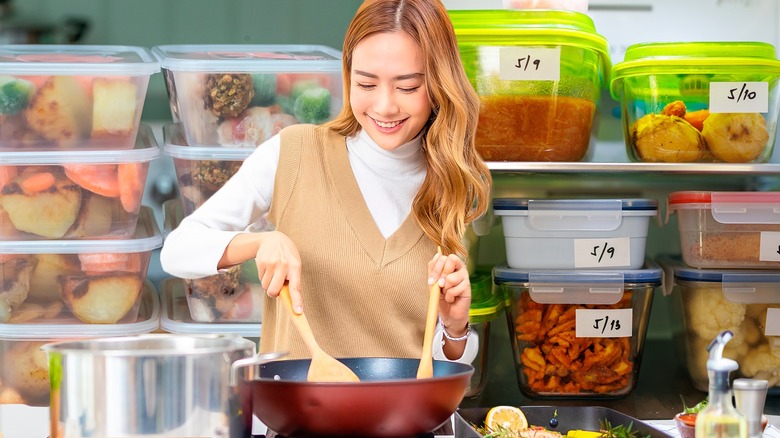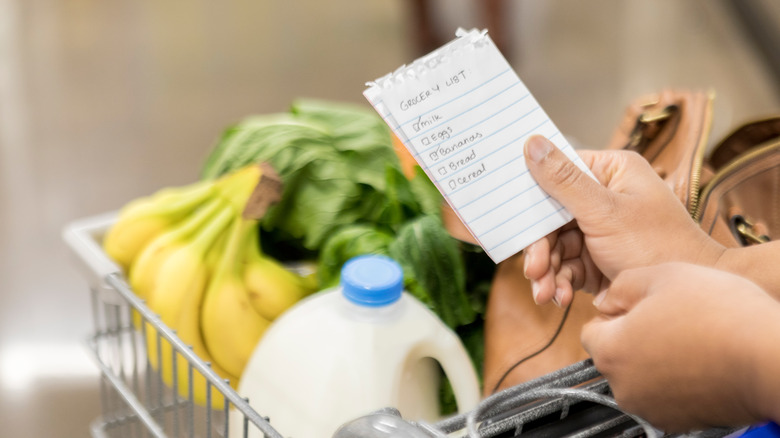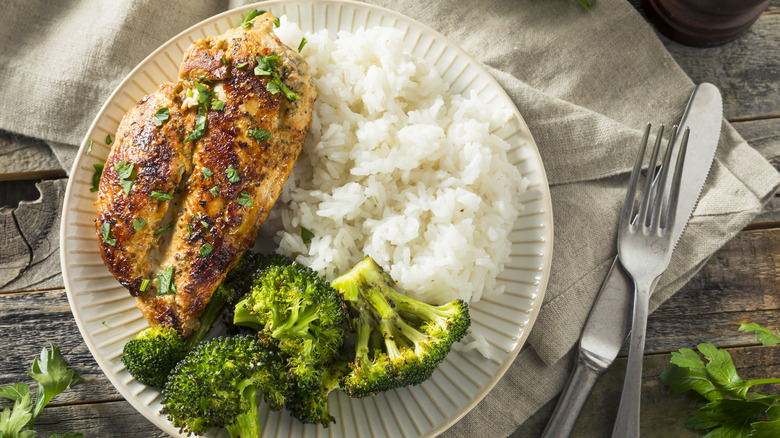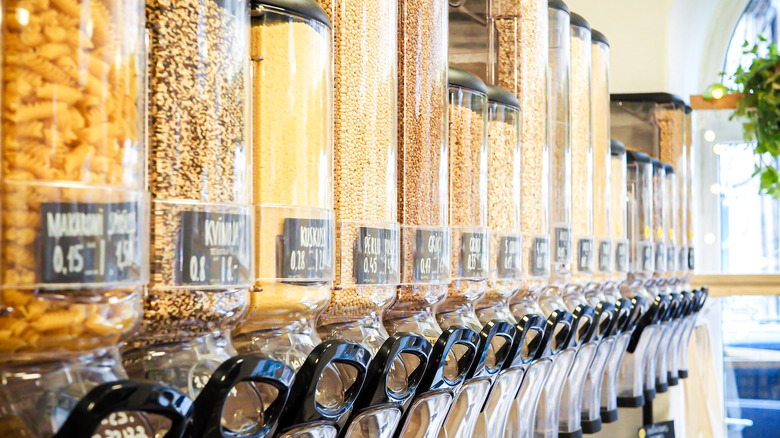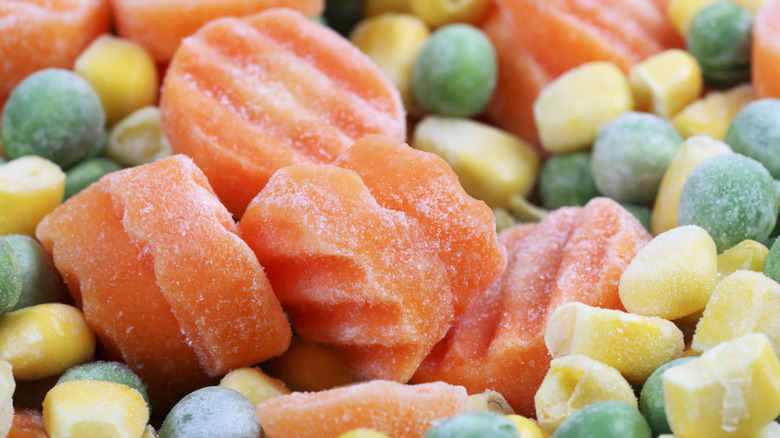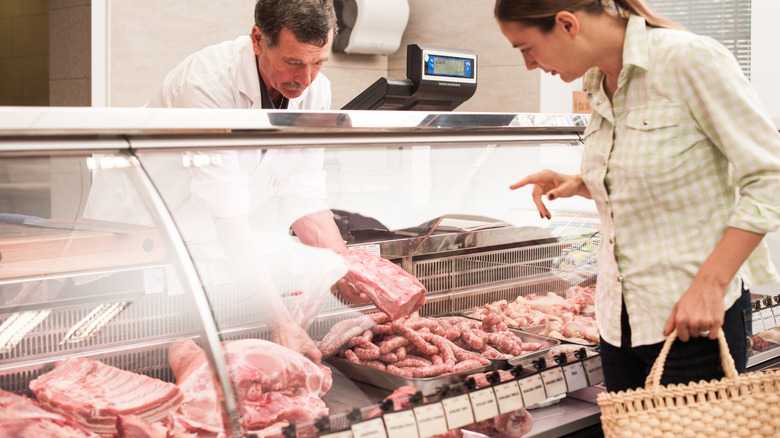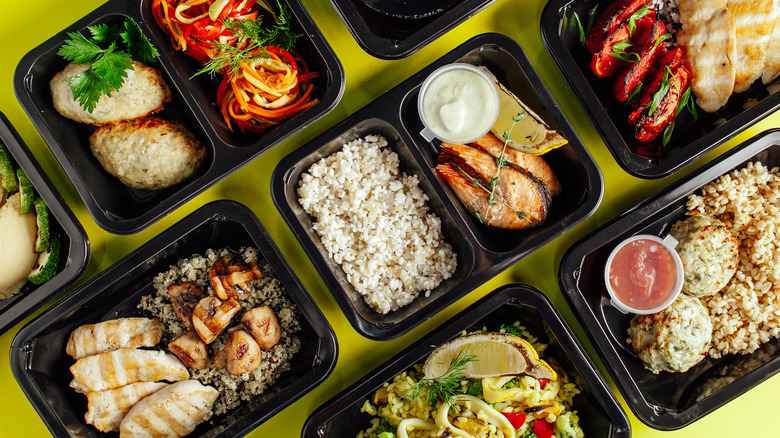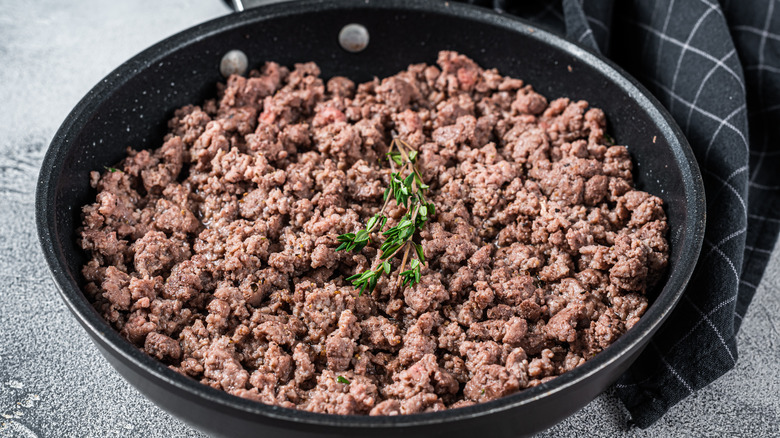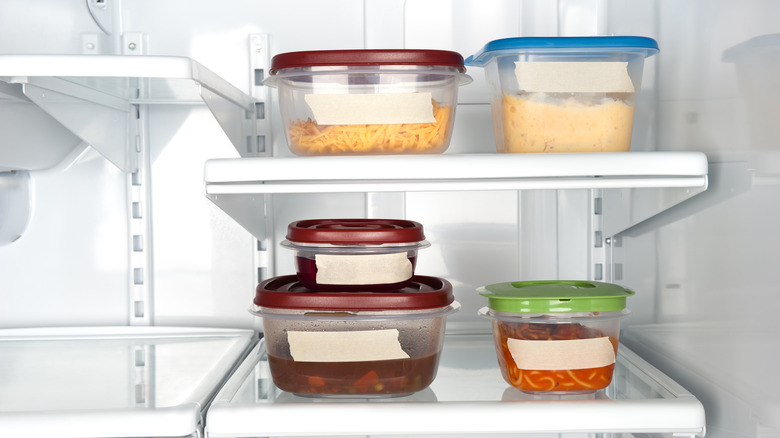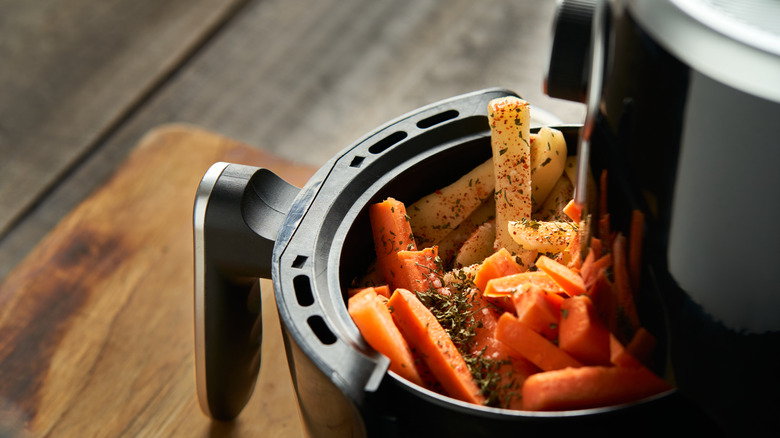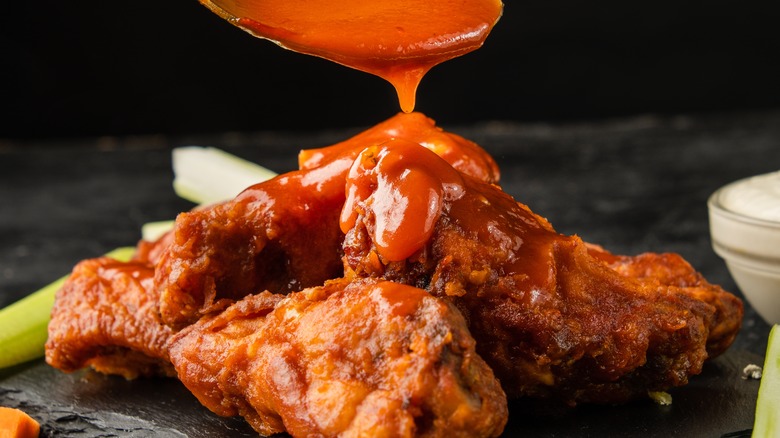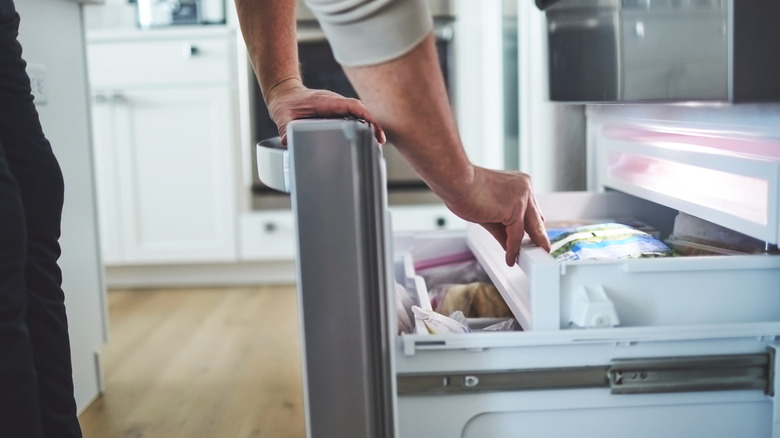12 Helpful Tips If You're Only Cooking For One Person
For some people, cooking can be a fun, relaxing part of your day and a potential outlet for creativity. But if you're cooking for just yourself, that outlet can quickly turn into a tedious and unforgiving task. If you have a goal to cook more often but you don't know where to start, there are some helpful tips that can make cooking for one easy, affordable, and delicious. And no, you don't have to resort to eating the same meals every day for breakfast, lunch, and dinner — unless, of course, you want to! (Some tips even include how to make bulk-cooking meals easier.)
How you plan your week of meals, where you shop for ingredients, and what appliances you're using each day can turn this overwhelming daily task into a no-brainer each week. Plus, these tips can also help you save money and reduce food waste along the way. Talk about a win-win!
1. Plan your meals ahead of time
Whether you're cooking for one or for a large family, the sentiment of planning your meals before grocery shopping is extremely important. As much as you might think you'll remember every ingredient in your new recipe or the pantry staples you've run out of — and that you won't add unnecessary items to your cart as you peruse the aisles — going shopping without a list is just unrealistic. This holds especially true, though, when you're cooking for one person.
When planning out your meals and grocery list ahead of time, you'll make sure you're only bringing home items you will actually use and eat. Since limiting food waste and maintaining a budget can be a huge priority when cooking for yourself, this one step alone can help you make sure you're staying on track. This step doesn't mean you need to skimp at the store, though. You can still tackle a new recipe or make a more involved meal, but knowing exactly what you need will keep you organized.
Some items, like lettuce or a package of protein, can make it hard to portion for one. In these instances, plan meals with overlapping ingredients, so you don't end up with leftovers that will eventually go bad. For instance, if you like to cycle between a couple of chicken and beef dishes, try making all chicken dishes one week and then beef the next. You'll eat all of your food without buying too much at once.
2. Prioritize well-balanced meals
Cooking a well-balanced meal that includes all the protein, vegetables, fiber, and fats required for a healthy diet can be difficult no matter who you're cooking for. But finding the energy to prepare multiple elements for a meal might seem especially taxing when cooking for one. As enticing as it might be to cook a one-dimensional meal when cooking for yourself, it's still just as important to prioritize balance.
An easy way to manage this is to remember that vegetables can act as the focus for your meals, especially dinner. Once you have a vegetable source secured, you can work protein, fats, and fiber around that base. This formula will not only make sure you're eating a balanced meal every night, but it will also encourage you to eat all the produce you bought at the start of the week. This can also help with maintaining a budget when cooking for one person. One package of chicken can last multiple meals when you're mixing it with the right sources of fiber and vegetables.
While it can be easy to have a bowl of cereal or a can of soup for dinner, it's worth it to make a complete meal for yourself as often as possible. And if you can find simple, balanced recipes that you enjoy eating and making, it will make cooking for one easier than ever.
3. Shop bulk bins for smaller portions
Keeping your kitchen stocked with pantry staples sounds like a good option when cooking for one, but having large portions of some items can actually take up too much space in your kitchen when you're only making single portions at a time — and it can make it hard to remember what all your have and what is still good to eat. Rather than settling for the large bags of grains, beans, or pasta, take advantage of the bulk bins in grocery stores.
It's easy to assume buying from the bulk bins means you have to buy a lot of product, but that notion is actually misleading. You can actually buy less than what a pre-packaged container carries by measuring out just enough for single serving. You'll save money and space in your kitchen, making trips to the store more budget friendly while making sure your kitchen stays less cluttered.
This holds especially true if you're buying notoriously expensive items like nuts or spices, which are much more realistic to purchase in smaller quantities, especially when shopping for one person or for a specific recipe. You can also take advantage of shopping the bulk bins for items like flour and sugar. It's a great option if you want to tackle a fun baking project but don't want to deal with large quantities of leftover ingredients.
4. Don't forget about frozen produce
Fresh produce might look like the more appealing option when entering the grocery store, but if you're not positive you'll finish all of it before it goes bad, you're better off shopping the frozen aisle. You don't have to skip fresh produce altogether, but there are certain items that you are definitely worth grabbing from the frozen section.
Despite the common belief that fresh produce is more nutritious, studies have actually shown that the difference in vitamin content between fresh and frozen fruits and vegetables is either non-existent or at times higher in frozen produce. This is due to the time fresh produce spends in extreme conditions when in transit and the fact that fresh produce is typically picked earlier before it's able to fully ripen on the vine.
In addition to reaping the same nutritional benefits as fresh produce, frozen produce also has a longer shelf life in comparison. If you're not in the mood to incorporate the same vegetables into multiple meals each week, you can opt for frozen vegetables to give you the freedom to be creative with your meals without risking throwing away leftovers. Plus, frozen veggies come cleaned and cut, so you will cut down on prep time and can get produce out of season, which usually isn't an option when shopping from the fresh produce section.
5. Take advantage of the meat counter
Buying your meat pre-packaged can leave you with extra cuts that you don't need when cooking for one person, and frozen meat can be a frustrating option if you have a hard time remembering to take it out of the freezer with enough time to defrost. A good option for buying single portions of meat and ensuring you're only paying for what you need each night is to take advantage of the meat counter at the grocery store.
You can get really specific with the weight and amount of foods, including deli meat, cuts of poultry and beef, and seafood. This is a great option if you aren't a fan of meal prepping or only want to have meat one or two nights a week without having to risk any food waste. By ensuring you're only bringing home and paying for the exact amount you need, you'll save on your grocery bill while keeping your meals exciting without dealing with leftovers.
6. Lean on meal prepping
There are so many ways to prepare meals in advance (many of which are included in this article), such as cooking bulk ingredients for a variety of meals and taking full advantage of your freezer. But the point remains — doing some of the work ahead of time can make enjoying a home-cooked dinner every night easy and manageable. If you're feeling overwhelmed with the idea of cooking for one or you are finding the task tedious, this step should be an essential part of your week. Just make sure you're not making common meal prep mistakes, like prepping too much food or not making well-balanced meals.
While it might not be exciting to eat the same meal for breakfast, lunch, and dinner every day, it can certainly help if you're anticipating a busy week ahead. Making a large portion of rice, chicken, veggies, and overnight oats and portioning them out for the week can help meals feel less daunting. To make your plan easier to follow, it helps to have a good set of meal prep containers to keep your pre-made meals. Whether you pick containers with multiple compartments, containers large enough to hold big-batched ingredients, or freezer-ready containers, make sure you're finding a set that works for your needs.
7. Bulk cook and prep for different meals
Meal prepping doesn't need to be a tedious task consisting of spending your whole Sunday cooking every meal for the week. There are little steps you can make throughout the week that ensure you're using all of your food while making the process of cooking for one person less time-consuming. One step is cooking base ingredients like starches and protein once each week but using portions for different meals throughout the week.
For example, rather than making one portion of pasta each time you need it, cook a couple of servings at once and have one portion with sauce the first night and some in a pasta salad the next. You'll only spend time cooking the noodles once, but you'll have part of your next dinner ready. This also applies to cooking protein in bulk. You can use part of a cooked batch of ground beef for taco bowls one night then cook the rest in a casserole the next.
This principle also applies to prepping vegetables for the week. If you spend a little extra time prepping all of your veggies earlier in the week, you'll be able to throw them into meals or snack on them throughout the week. You'll be more likely to finish everything you bought while saving you time day-to-day.
8. Label your food with dates
Cooking for one means you're probably going through your food at a slower frequency than a family, especially if you're meal prepping items for the week. To ensure you're not accidentally letting food go bad or forgetting how long your prepped food has been sitting in the fridge, make sure to label everything.
You don't have to get too fancy with this step, either. Take a note from most professional restaurants, and invest in a roll of painter's tape and a Sharpie. You'll rip off a small strip of tape, write the date of the day you made that food, and put it on the outside of the container before storing your food in the fridge or freezer. It's a simple step, but it will keep your food organized and safe, so you never have to second guess the lifespan of your meals again. After all, that could result in accidentally eating something that has gone bad or throwing away perfectly good food prematurely.
9. Invest in appliances meant for smaller-portioned cooking
If preparing your meals in advance is not an option for your lifestyle, there are still ways to make cooking for one person more efficient. Appliances like air fryers and toaster ovens are great for making meals for groups of any size, including meals for one.
Air fryers can cook food in a fraction of the time compared to other cooking methods, plus they are great for single-portioned cooking. You can crisp up simple foods like potatoes, chickpeas, and other vegetables, upgrading even the simplest meals like salads or side dishes with minimal added effort. Air fryers also require minimal cleanup, which is a huge plus if you're handling all of the dishes yourself. Even leftovers are brought back to life in an air fryer, ensuring you're able to enjoy that delicious meal you made the night before to its fullest.
Toaster ovens are also a good alternative and can come in handy if you'd rather avoid cranking up the oven for a single-portioned meal. You can bake in smaller quantities, and there is even mini cookware that you can buy to make cooking with a toaster oven a daily option no matter what you're making.
10. Get creative with seasonings and sauces
Most tips surrounding cooking for one person rely on cooking with similar ingredients each night. Whether that means meal-prepping identical meals for breakfast, lunch, or dinner each week or finding meals with overlapping ingredients so you use all the protein and vegetables you bought, it can be easy to fall into a repetitive rut. And a repetitive food rut can make it easier to justify ordering in food from your favorite restaurant rather than cooking the groceries you bought. In order to avoid that slump, try experimenting with seasonings and sauces to keep even the most basic ingredients exciting.
Even if you're making the same chicken and rice dish a couple of times a week, each can be made completely different with the addition of a different sauce or spice combination. A batch of ground beef or ground turkey can be split into two sections and seasoned for burger bowls or tacos, salads can take on a whole new personality when different dressings are applied, and even pasta can feel totally different when a heavier red sauce is used one night then replaced with a light olive oil and cheese coating.
Getting really creative with the foods you're cooking doesn't have to mean making something entirely new each night. Even the simplest changes can keep easy-to-make meals feeling new.
11. Don't forget about the farmers market
Another way to get really specific about the portions of food you're buying is by shopping at a farmers market. You'll have more control when buying produce that can otherwise come prepackaged in larger quantities at the grocery store. While you might end up spending a little more on produce, it's a great way to ensure you're getting really fresh, high-quality options without buying too much at a time. Besides, there is no reason shopping and cooking for one should equate to skimping on quality produce.
Shopping at the farmers market can also help you get out of a cooking rut, which is especially easy to get into if you're cooking for just yourself. Take a look at what seasonal produce the stands are offering and challenge yourself to give something new a try. You just might find a new ingredient for a meal you love and can incorporate into your repertoire.
12. Use your freezer to its full potential
Freezers can easily end up as vaults of forgotten liquor bottles, old ingredients, half-finished meals, and frost-bitten fruits and vegetables, which frankly is a shame. When used properly, the freezer can be any home cook's best friend, especially if that home cook is cooking for just themselves.
After giving your freezer a good clean out (let's be honest, everyone's freezer could use it!), take advantage of the space by storing perishable items that are traditionally sold or cooked in bigger quantities, like rice and bread. This is especially helpful for bread considering it can also be toasted from frozen, so you never have to worry about waiting around for it to defrost.
If you prefer to cook in larger quantities to ensure you have ingredients prepped for later, the freezer can really come in handy. Gadgets like Souper Cubes, which can definitely hold more than soup, are a big help. You can portion out cooked rice, homemade pesto, pasta sauce, and herbs in olive oil, so you only need to defrost and cook what you need. This is especially helpful for someone cooking for one since you can make a big-batched meal, freeze the leftovers, and enjoy them whenever you feel like it — no more eating the same soup night after night because you don't want it to go to waste.
